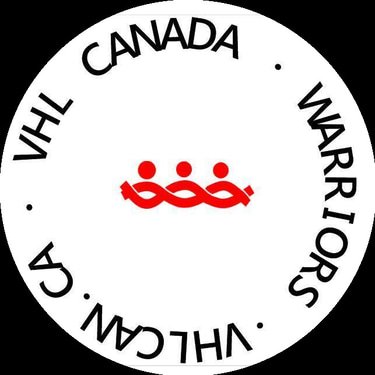🍁 VHL Intro and Advances
Von Hippel-Lindau disease [VHL or VHL Syndrome] was first recognized as a rare disorder running in families in the late 1800s. Patients present with tumours involving the brain, spine, retina, kidney and adrenal gland, along with cysts in various parts of the body such as the pancreas and reproductive organs. In 1993, the VHL gene was identified providing a critical advancement in the understanding and treatment [e.g. surgery] of VHL disease. It is estimated that VHL has a frequency of 1 in 30,000-40,000 people [900+ in Canada], but this is likely an underestimate.
More pervasive genetic testing has led to identification of previously underrecognized cases. The VHL gene is involved in many biological pathways, and is one of the most frequently altered genes in kidney cancer; involved in polycythemia, and importantly, the hypoxia inducible (HIF2alpha) pathway. This led to the discovery of belzutifan [Welireg] , a HIF2alpha inhibitor, and the first precision cancer medicine for VHL patients, approved in 2021. This monumental discovery led to William Kaelin, Peter Ratcliffe and Gregg Semenza receiving the 2019 Nobel Prize for their discoveries of how cells sense and adapt to oxygen availability.
In parallel to these scientific and clinical progressions, the VHL patient community has been critical to advancing the VHL field. More than twenty- five years of work has helped shape the VHL Alliance [Boston USA, 1993] into the pre-eminent resource for patients, caregivers, researchers, and the medical community. In addition, the VHL Alliance is part of an international network serving an estimated 15,000 people worldwide, in 108 countries...
On a biennial basis, the VHL community holds an International Medical/Research Symposium aimed at updating VHL researchers and clinicians on the most recent advances in research, and current best practices of clinical care [there have been nearly three decades of these biannual meetings] …. The last few years especially have seen enormous advances in both understanding the molecular events consequent to VHL inactivation, as well as clinical understanding and treatment [e.g. drug therapy] of VHL manifestations. We are looking forward to the presentation of new data that will enable VHL-mutation carriers to lead normal lives and generate insights into the fascinating molecular biology…
-----
* The virtual 15th International VHL Medical/Research Symposium, November 3-5, 2022
